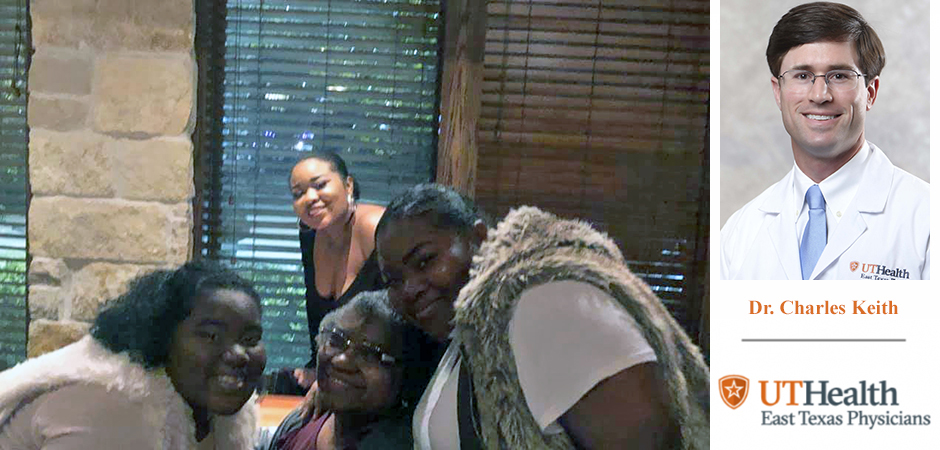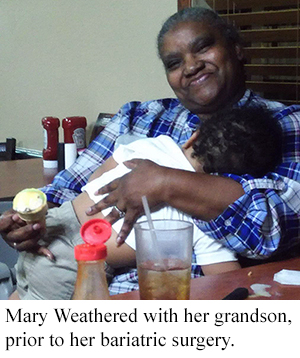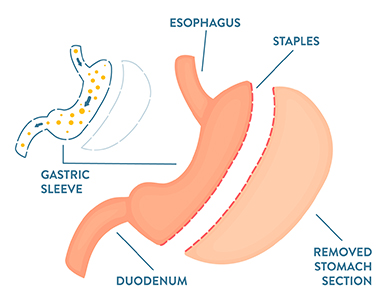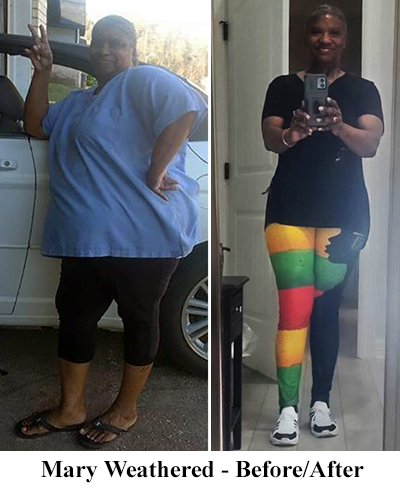
To care for the health and needs of others, Mary Weathered knew that she first had to improve her own health.
Shown above with her granddaughter Jai’mya, Weathered (left) was born and raised in St. Augustine, Texas. Though she lived for a time in Lufkin, she moved back to St. Augustine to become a home health aide for family members and others.
“I moved back home to help my sister who can’t walk,” said the 68-year-old Weathered. “I have two adult daughters and many grandchildren, so there’s always something to do.”
At her heaviest, Weathered weighed 274 pounds and suffered from arthritis  in her knees. She also dealt with diabetes.
in her knees. She also dealt with diabetes.
“I had trouble tying my shoes, sitting in a chair, crossing my legs and moving around a lot,” she recalled. “I really wanted to walk for longer periods and be able to bend over.”
Knowing that she needed to do something about her weight, Weathered connected with Charles Keith, MD, at UT Health Tyler Bariatric Center.
Sleeve gastrectomy surgery
Dr. Keith and the team met with Weathered and discussed with her the different kinds of bariatric surgery: gastric bypass, sleeve gastrectomy, adjustable gastric band and duodenal switch.
“The staff took good care of me,” said Weathered. “Dr. Keith has a sense of humor, which I love. Dr. Keith always sat and talked with me whenever I went to their office. The staff told me how to prepare for the surgery, what to start eating and what not to eat. They were great.”
 Weathered chose sleeve gastrectomy surgery, which involves the removal of a large portion of the stomach. It keeps the stomach at the same length but with a much slimmer width, like a shirt sleeve. No changes are made to the intestines.
Weathered chose sleeve gastrectomy surgery, which involves the removal of a large portion of the stomach. It keeps the stomach at the same length but with a much slimmer width, like a shirt sleeve. No changes are made to the intestines.
Bariatric surgery at UT Health East Texas is performed with minimally invasive techniques. That means small instruments are used through small incisions and a camera for visualization. This leads to less pain, shorter recovery and better outcomes for the patients.
With a sleeve gastrectomy, approximately 80% of the volume of the stomach is removed. After surgery, patients eat much smaller meals and tend to have fewer cravings and hunger than they did before surgery. This is because most of the 'hunger hormone' is created in the portion of the stomach that is removed. Less 'hunger hormone' is produced as a result.
New way of eating
 Weathered started her recovery from surgery by concentrating on getting back to work to take care of others. “I didn’t do any formal rehabilitation program, I just took it easy,” she said. “When I started back to work, I worked a lot with a steady routine.”
Weathered started her recovery from surgery by concentrating on getting back to work to take care of others. “I didn’t do any formal rehabilitation program, I just took it easy,” she said. “When I started back to work, I worked a lot with a steady routine.”
When she sat down for meals, it took time to adjust to a new routine. “In the beginning, I always put more food on my plate than I could eat,” she recalled. “I would take 3-4 bites and that would be it. I guess my stomach had to get used to being small.”
Weathered makes proteins and vegetables a priority in her meals since those food categories are most important for her health. She still eats her favorite foods, even if the portion sizes are much smaller.
“I grew up in the country, so I’m a chicken and greens eater,” she said. “I don’t like steak, but I like pork chops. I just don’t eat as much as I used to.”
She has recommended bariatric surgery and Dr. Keith to family members and friends.
“I’ve been spreading the word. Folks watched how the weight fell off me and wondered what I was doing, so I told them my story.”
Now she weighs 181, just six pounds away from her weight nearly fifty years ago. She also had another surgery to remove the excess skin that remained after her weight loss.
Through it all, Weathered is pleased to be back at work and helping care for the people who depend on her.
Well done, Mary!
For more information and to determine if you qualify for weight-loss surgery, visit our web page or call 903-593-0230.

